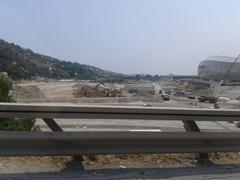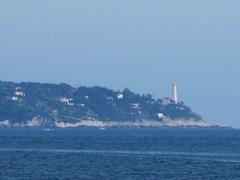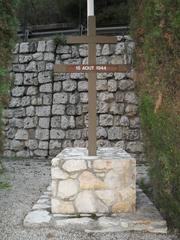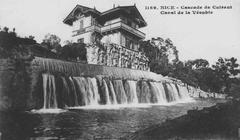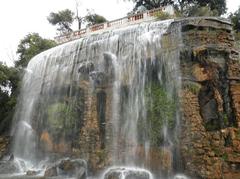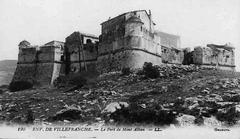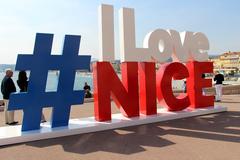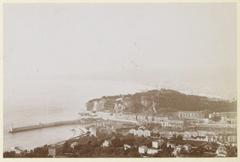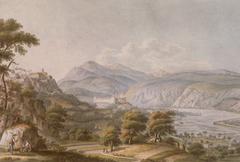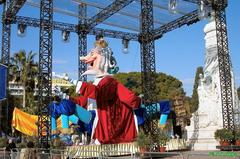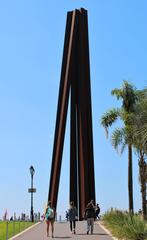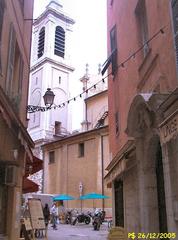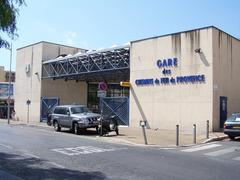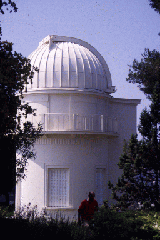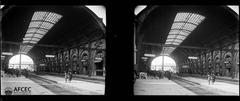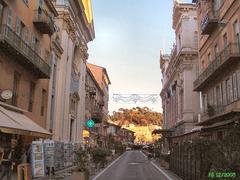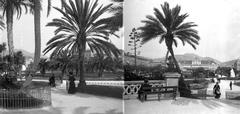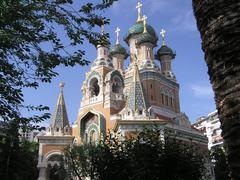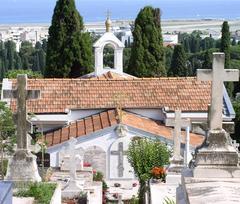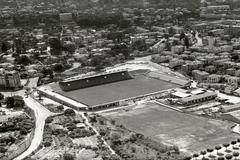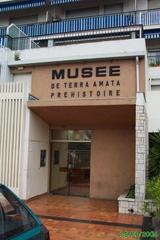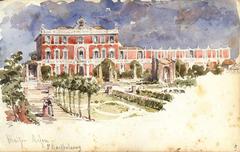
Palais des Congrès Acropolis Nice France: Visiting Hours, Tickets, and Travel Guide
Date: 04/07/2025
Introduction
The Palais des Congrès Acropolis in Nice, France, was a landmark of modernist architecture and a pivotal hub for international business tourism, culture, and community life. Since its inauguration in the mid-1980s, the Acropolis stood as a testament to Nice’s ambition to become a leading destination for events and congresses. Its history, architectural significance, and the ongoing urban transformation of its site make it an essential chapter in the story of Nice.
This detailed guide covers the history and legacy of the Acropolis, practical visitor information—including visiting hours and ticketing before closure—urban integration, the demolition process, temporary alternatives, and future congress center developments. Whether you’re a history enthusiast, event organizer, or visitor keen on Nice’s cultural landscape, this resource offers insights and tips for exploring this dynamic area.
For the most current updates on events, tickets, and accessibility, always consult the Nice tourism website and the Palais des Congrès Acropolis official page.
Table of Contents
- Historical Overview and Evolution
- Architectural Features and Facilities
- Economic and Cultural Significance
- Renovations and Civic Roles
- Demolition and Urban Transformation
- Visitor Information: Hours, Tickets, Accessibility
- Transitional Venues and Future Projects
- Frequently Asked Questions (FAQ)
- References
Historical Overview and Evolution
Origins and Conception
The Acropolis was conceived in the late 1970s by Mayor Jacques Médecin to establish Nice as a premier destination for business tourism, replacing the obsolete Casino Municipal. The final site was selected atop the covered Paillon river, integrating the venue into the city’s evolving urban fabric (Wikipedia; GoAskALocal).
Design and Construction
Construction began in August 1981, led by architects Buzzi, Bernasconi, and Baptiste. The building’s modernist silhouette and 338-meter nave evoked a ship, an homage to Nice’s maritime heritage. Officially opened in 1984, the Acropolis featured the renowned Apollon Auditorium, capable of seating 2,500 guests (pss-archi.eu; France3 Regions).
Architectural Features and Facilities
Complex Layout
The Acropolis combined a congress center and an exhibition hall, covering nearly 38,000 m². It housed five auditoria, over 50 meeting rooms, and flexible exhibition spaces. Its modernist architecture featured glass, concrete, and Mediterranean influences, with amenities such as a bowling alley, cinémathèque, restaurant, and rooftop terrace (pss-archi.eu; Wikipedia).
Artistic and Functional Spaces
The building showcased works by artists like Paul Belmondo and Victor Vasarely, reinforcing its cultural role. The Apollon Auditorium, with a vast stage, hosted concerts, operas, and international congresses, while other rooms supported exhibitions and community events.
Economic and Cultural Significance
Business Tourism Hub
The Acropolis was central to Nice’s economy, hosting medical, scientific, and technological congresses, in collaboration with the University of Nice and Sophia Antipolis (Wikipedia). Annual events such as the Foire de Nice, Luna Park, and major sports competitions, including the 1999 Davis Cup final, solidified its status (France3 Regions; RCF).
Community Role
Beyond hosting events, the Acropolis was a civic gathering point. It was used for public viewings, including during significant trials, and contributed to city life through art, sport, and cultural engagement.
Renovations and Civic Roles
Renovations (2010–2012) modernized technical systems and improved accessibility, led by architect Jean-Michel Wilmotte (pss-archi.eu). Management changes and technical upgrades ensured the Acropolis remained competitive among European congress venues.
Demolition and Urban Transformation
Rationale for Demolition
By the early 2020s, urban priorities shifted towards sustainability and green public spaces. The city council, under Mayor Christian Estrosi, approved demolition to extend the Promenade du Paillon, aiming to improve environmental quality and urban life (France3 Regions; Nice Presse).
Demolition Timeline and Sustainability
Demolition began in March 2023, targeting completion by mid-2024. The process emphasized sustainability, with at least 70% of materials salvaged for reuse (Nice Presse; Nice Matin).
Urban Renewal
The site will become part of the expanded Promenade du Paillon, adding eight hectares of park space and a new 10,000 m² esplanade. This green corridor enhances Nice’s UNESCO World Heritage status and urban resilience (Nice Côte d’Azur).
Visitor Information: Hours, Tickets, Accessibility
Before Demolition
- Visiting Hours: Generally 8:00 AM – 8:00 PM during events; access depended on event schedules.
- Tickets: Event-specific, available via official websites or on-site box office.
- Accessibility: Fully wheelchair accessible with ramps, elevators, and adapted facilities.
- Location: 1 Esplanade Kennedy, accessible by tram (line 1, Acropolis stop), bus, or car.
- Nearby Attractions: Old Town (Vieux Nice), Promenade des Anglais, Cours Saleya market.
During Transition (2023–2025)
- Acropolis: Closed to the public due to demolition.
- Temporary Venues:
- Nikaïa Provisional Structure: Hosts congresses and exhibitions. Hours and tickets depend on event organizers (Nice Côte d’Azur).
- Pavillon de la Mer: At Port of Nice, for major international events (Nice Premium).
Future Congress Center (Opening Late 2025)
- Location: Grand Arénas district (MIN Fleurs site), near the airport and transport links (Nice Secret).
- Facilities: Modular auditoria (up to 2,500 seats), exhibition halls, meeting rooms, outdoor spaces, full accessibility.
- Tickets and Visiting Hours: To be announced via official channels.
Transitional Venues and Future Projects
To maintain Nice’s business tourism momentum, the city has invested in temporary facilities and is developing a next-generation congress center. The Nikaïa provisional site and Pavillon de la Mer ensure continuity until the new Palais des Congrès opens at Grand Arénas in late 2025 (Nice Premium). The new complex will feature state-of-the-art, eco-friendly design and multifunctional spaces, supporting Nice’s status as a global event destination.
Frequently Asked Questions (FAQ)
Q: Is the Palais des Congrès Acropolis open to visitors?
A: No, it is permanently closed as of 2023 and undergoing demolition.
Q: Where are events being held during the transition?
A: At the Nikaïa provisional structure and Pavillon de la Mer. Check official event pages for schedules and ticketing.
Q: When and where will the new congress center open?
A: Late 2025, at the MIN Fleurs site in the Grand Arénas district.
Q: Are facilities accessible for people with disabilities?
A: Yes, all current and future venues are designed with full accessibility.
Q: How can I stay informed about events and tickets?
A: Monitor the Nice Côte d’Azur tourism website and event organizers’ official sites.
Summary and Call to Action
The Palais des Congrès Acropolis was a cornerstone of Nice’s economic and cultural vibrance for over four decades, symbolizing innovation and community. Its ongoing transformation into an expanded urban park and a new congress center reflects the city’s commitment to sustainability, quality of life, and global connectivity (pss-archi.eu; France3 Regions; Nice Presse; Nice Premium).
To stay up to date with visiting hours, ticketing, and event news during this exciting transition, rely on official resources and consider using the Audiala app and social channels for personalized alerts and travel tips. Embrace the legacy and be part of Nice’s next chapter as it reimagines its urban heart.
References
- Acropolis (Nice), Wikipedia
- Il y a 40 ans, Jacques Médecin inaugurait le Palais des Congrès Acropolis à Nice, France3 Régions
- Palais des Congrès Acropolis, PSS-Arch
- Demolition update, Nice Presse
- Temporary venues, Nice Premium
- Urban integration, GoAskALocal
- Economic and social impact, RCF
- Parc des Expositions et des Congrès, Nice Côte d’Azur
- Futur Palais des Congrès, Nice Secret
- Nice Matin coverage on demolition






